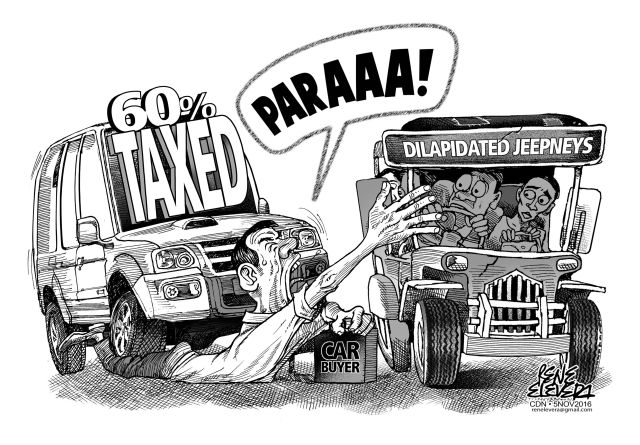A proposed bill by the Duterte administration to substantially raise taxes on cars can be a double-edged sword insofar as regulating the number of privately owned vehicles on the road is concerned.
According to Albay Rep. Edcel Lagman, who opposes the bill, taxes for cars priced P600,000 below will be charged two to five percent higher; 20 percent for cars worth P600,000 to P1.1 million; 40 percent more for cars priced P1.1 million to P2.1 million; and 60 percent for vehicles selling above P2.1 million.
The opposition congressman said higher taxes on cars will force car owners or those buying their first car to choose lower-end units that are smoke belchers or those that break down easily compared to current models.
It will also affect car companies that may be forced to cut down on labor costs and sell lower quality vehicles to their customers. What’s worse, part of the tax reform package includes raising taxes on diesel fuel which may force public utility vehicles (PUVs) to demand fare rate increases amid the plunge in global fuel prices.
We understand that there are some bills that are being deliberated on by Congress in order to regulate the number of vehicles on the road as well as ensure the purchase and acquisition of environment-friendly cars or e-vehicles to reduce pollution.
One such bill prohibits persons from buying cars unless they can produce proof that they have parking spaces for their vehicles. The bill is obviously patterned after similar laws in Japan and Singapore, two countries with limited land space.
The bill may benefit used-car dealers who often struggle to dispose of their vehicles due to competition from malls and car shops, and their payment plans are scaled down to make it more affordable to consumers, who can now avail of premium smartphones through similarly affordable postpaid plans.
With higher taxes on cars, maybe buyers would be forced to buy cheaper, not necessarily better, vehicles to the detriment of their comfort, safety and convenience, as well as the people who had to
contend with the smoke produced by their inadequate exhaust pipes.
If the government and the transport sector hope to compel people to reduce the use of their cars in favor of the existing antiquated mass transport system, then they’re dead wrong.
Should the public, specifically motorists, be made to sacrifice their comfort and convenience in favor of riding antiquated jeepneys and buses in order to reduce the traffic congestion?
Surely there are better ways, such as encouraging carpooling and maybe even regulating private transport booking services like Uber. The proof of parking space bill is a sufficient check to avoid
unbridled acquisition of private vehicles.
If the government wants to reduce private car use, then they better upgrade the mass transport system to include buses and trains.
Disclaimer: The comments uploaded on this site do not necessarily represent or reflect the views of management and owner of Cebudailynews. We reserve the right to exclude comments that we deem to be inconsistent with our editorial standards.

